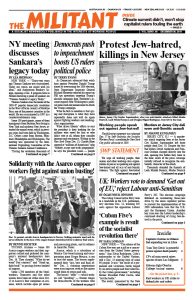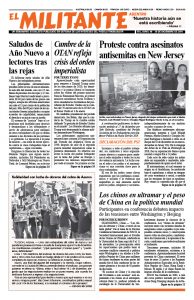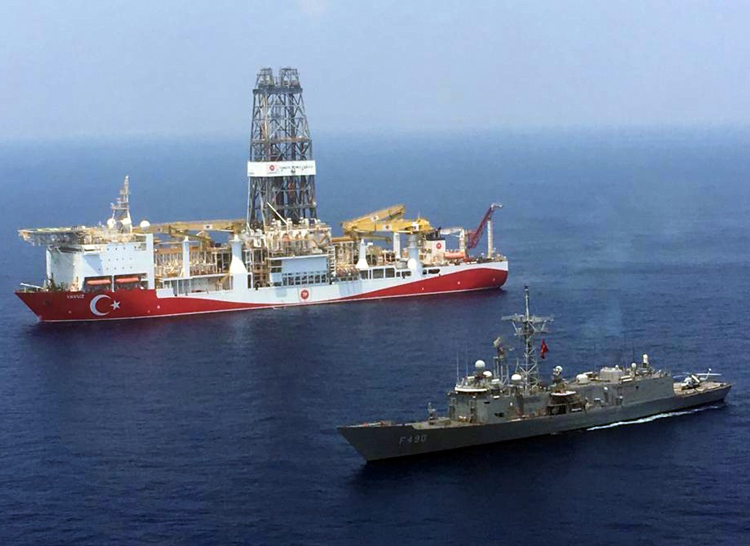The escalating battle for control of Libya — and especially its vast oil and gas wealth — intensified Dec. 12. The yearslong conflict between rival forces in the east and the west of this north African country is being transformed by stepped-up foreign intervention from imperialist powers and regional capitalist governments alike. They back one or the other side — some, like Washington, try to straddle both — as they vie for regional sway and access to Libyan oil profits.
The U.N.-recognized Government of National Accord, based in the capital Tripoli, is associated with the Muslim Brotherhood and backed by the rulers of Turkey and Qatar, as well as Italy and, to some extent, Washington and Beijing. It is weak and heavily reliant on Islamist militias from Misrata, the second-largest city. The rival force in the east is led by Khalifa Haftar’s Libyan National Army. It is funded by the governments of the United Arab Emirates and Saudi Arabia, and backed by Cairo and Paris. And now Moscow has sent growing numbers of troops to break the stalemate.
Haftar had been a general in the early decades of the regime of Moammar Gadhafi, but broke with the dictator in 1987 and spent the next 24 years in Washington, D.C. He returned to Libya after Washington and its NATO allies overthrew and killed Gadhafi in 2011.
This many-sided political and military jockeying makes a mockery both of the U.N. “arms embargo” against interfering in Libya, and rival capitalist governments claiming they are looking to reinforce “political stability.”
Turkish President Recep Tayyip Erdogan promised Dec. 15 that if the Government of National Accord requests it, he will order a “quick reaction force” to intervene to counter over 1,000 Russian troops with advanced weaponry sent in recent months to back Haftar’s Libyan National Army, which has laid siege to the capital.
The Turkish rulers concluded a security pact with the government in Tripoli Nov. 27, seeking to bolster their ally and extend their offshore drilling rights. That agreement is contested by the governments of Greece, Cyprus and Egypt. Athens’ claim to the drilling rights is backed by the EU.
Erdogan’s government — which aligns itself with the Muslim Brotherhood in and out of government in the Middle East — is a rival to the military government in Egypt, which is led by former general and head of military intelligence President Abdel-Fattah el-Sissi. He came to power by overthrowing and imprisoning former Muslim Brotherhood leader Mohammed Morsi and crushing the group.
Paris also backs Haftar, whose forces control over three-quarters of Libyan territory, while Rome backs the besieged central government. This has given French oil giant Total the upper hand over Italian rival ENI for control of the country’s vast petroleum reserves.
The Donald Trump administration, seeking to protect U.S. imperialist interests, backs the Tripoli government diplomatically but has simultaneously opened relations with Haftar.
Moscow escalates conflict
Emboldened by the success of its military intervention in stabilizing the Bashar al-Assad regime in Syria, Moscow began sending battle-seasoned Russian soldiers, including snipers, to fight in Libya as “private military contractors.”
In recent weeks, Moscow’s intervention has jumped to over 1,000 troops backed by fighter bombers and artillery support. This has allowed Haftar’s troops to punch their way into parts of Tripoli. Erdogan, who is importing Russian missile batteries from Moscow, has urged the regime of Russian President Vladimir Putin to withdraw its forces from Libya. The two are due to meet Jan. 8.
The only regional player missing so far is Tehran, though a Revolutionary Guard vessel was observed sailing off of Misrata earlier this year. “The vessel is involved in suspicious activities,” a Tripoli government spokesman said on television.
These capitalist powers intervening in Libya mirror similar conflicts throughout the Middle East — in Syria and elsewhere. This reflects the continuing fracturing in the imperialist “world order.”


